
(Image)
“Hi Celes! I’m a student in high school. I am writing to you because I have no clue what to do… Since forever, I have a passion for knowledge. I am interested in EVERYTHING. I wanna learn more about things especially different religions, history, art, anthropology, why we are here, philosophy, science, etc. I start reading online about one thing and it never ends there.
This actually makes me very upset because I don’t know what to learn in order to make a living and I feel like I am nothing compared to the great people I read about. My parents just want me to make money and say I shouldn’t learn something that’s not “practical.” I wanna learn everything but also be active and create. So what should I learn? And if I learn, how can I make use of this knowledge, besides enjoying it?” — Nana
What do you do when you want to learn EVERYTHING? What do you pursue when you have many passions and interests in different things? I often get this question so I’d like to answer this in today’s post.
Gaming
First, let me share my passion story. When I was really young, like 7, my brother introduced me to video games. I still remember the first console our dad bought for us was Micro Genius, an 8-bit console. Ancient, I know — this was in 1991. One of the first games we played was Super Mario. We subsequently got newer consoles as they got released over the years, from Sega Genesis to Dreamcast to Playstation to PlayStation 2.
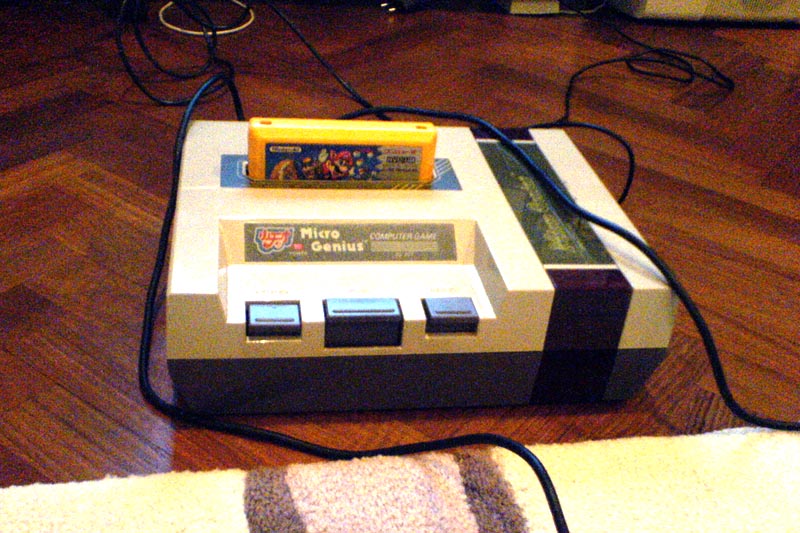
Micro Genius, now an obsolete console (Image)
My brother and I would play games together, though as we grew older, I became the one playing the games. From RPGs, to fighting games, to horror games, to action-adventure games, I played them ALL.
I didn’t just play as a casual gamer too — whenever I played a game, I would play it to the extreme where I would get absolute high scores, learn every Easter egg, unlock every bonus, and play it continuously ad nauseam. For the RPGs / story games, I could even retell the scene and the exact dialogue. And we’re talking about over 100 games in total!

Some of the many, many games I played growing up
My intense gaming would continue into my teens, all the way till I graduated from university.
Web Development
When I was 14 (1998-1999), the internet boom came. Almost everyone got a PC and my parents, with their limited savings, pooled money to get one for me too.
During this period, I learned to navigate the web, use IRC and ICQ (the most popular chat programs back then), and play LAN games. One day when chatting with an online friend, he told me about this guy from China who was running a popular website (that was in Chinese) on desktop enhancements like wallpapers, skins, screensavers, and the like — and supposedly making good money off it!
Intrigued, I thought, You can earn money just from making websites? If I could earn money and get started on my long-term goal to support my parents and do them proud, then I was all for it. So I looked up, “How to start a website.”
Within that week, I created my first site. Since I already knew that desktop enhancements were a tried and proven topic, I based my website on this topic but with my own style and content. Every day, I would rush home after school to build my site. From HTML coding, to web design, to graphic editing, to online marketing, to web administration, I learned everything needed to build a great site.
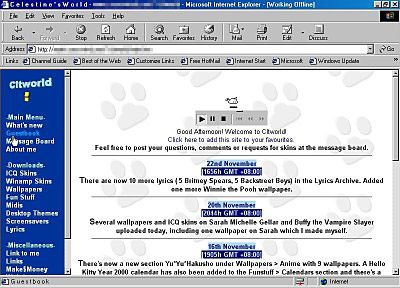
My first website, Celestine’s World. This screenshot is all I have left after all these years!
My site grew, fast. Because I was massively building the site, marketing it, and creating a lot of good content, I was gaining quick traffic. Within a year, I received over 100,000 visitors a month. My site had evolved into one of the largest portals online for desktop enhancements. I was sort of living a double life: in the day, I was this introverted kid in school; outside of school, I was the owner of this large web portal that many people around the world were visiting. Every day, I worked on my site tirelessly; every day, I updated it with new content. I was creating a lot of high-quality content on my blog and got immense satisfaction from doing so.
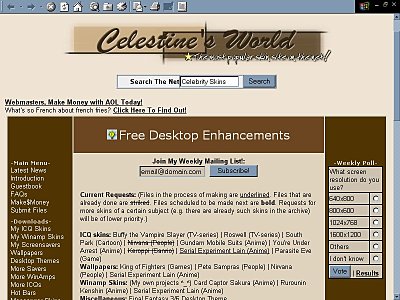
My site in 1999. By then I had gotten my domain and was on a private server.
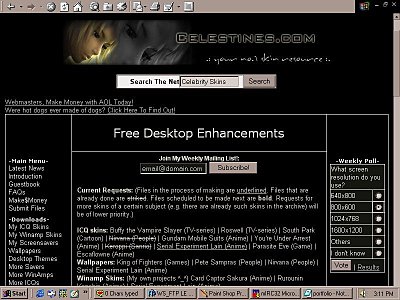
New look in 2000. At this point my traffic was over 300,000 visitors/month!
By then, earning money was no longer the key to me. I was more enticed by what the web could offer — the ability to learn new skills, to create something of value, to meet talented webmasters online, and to make a difference to others.
So, I began to launch more sites. And by sites, I mean many of them:
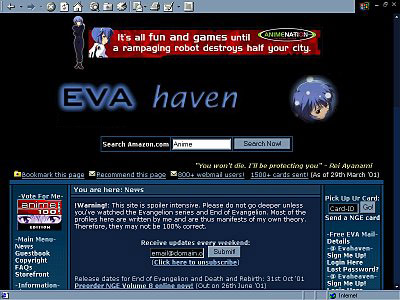
I loved anime in my teens, so I created a fan site for Neon Genesis Evangelion, a wildly popular anime then
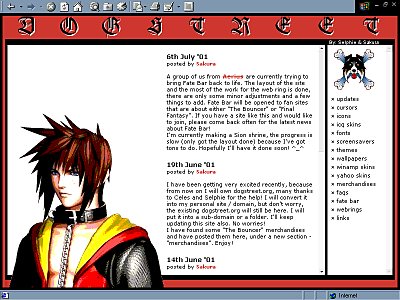
I also loved video games so I collaborated with a fellow webmaster to create a fan site for a popular PS2 game called The Bouncer
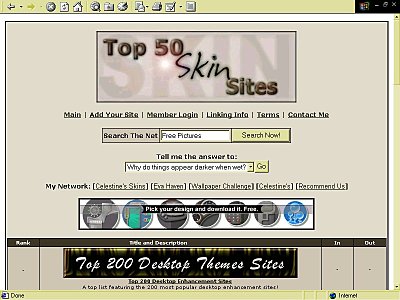
Voting sites were really popular then so I launched one for desktop enhancement sites
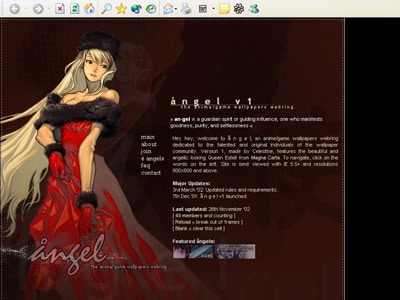
I also headed a webring for wallpaper sites as webrings were really popular then too
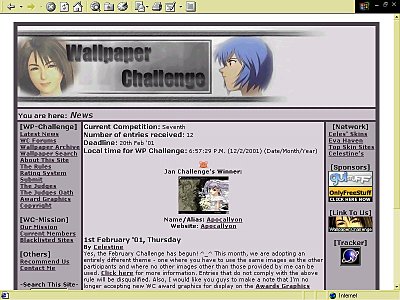
I also spearheaded a platform for wallpaper designers to connect and share ideas. It became very well-known and was the go-to place for wallpaper designers.
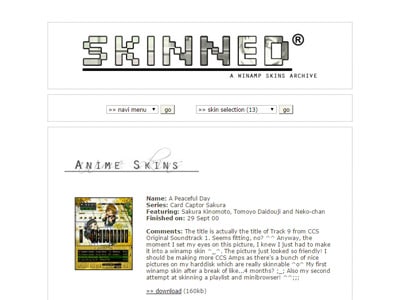
I created a site for Winamp skins as I loved making Winamp skins
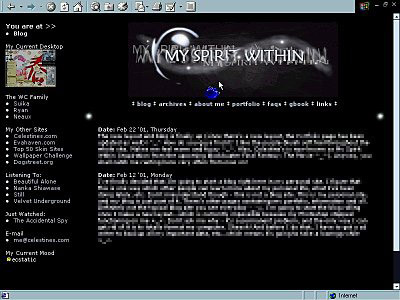
I also had a personal site and blog. At that time, blogs were purely personal journals, nothing like the content sites they’ve become today.
By 2001, I had created 10 different websites, each with its unique content and layout. Each site became very popular and in total they had over half a million visitors a month! I was having all these visitors from around the world visiting my sites, sending endless requests, and leaving grateful feedback. This web experience was one of the best things in my teenage years and I remember feeling very happy and excited whenever I was working on my websites.
Web, Graphic Design
During this period, I also cultivated an interest in web and graphic design. While I started off with absolutely no knowledge in it — I was in the science stream and knew absolutely nothing about web/graphic design — I picked up the skills myself by randomly downloading graphic software, reading up online, and spending countless hours fiddling in it.
Design was fun in a way. I saw it as my way of connecting with seasoned wallpaper/skin creators online, who had been around and creating digital works long before I started my sites. I found it aspirational that everyone was creating such beautiful artwork and wanted to be great at my craft too. I constantly studied others’ materials to see what they were doing, and used them as benchmarks to get better at my work.
So be it ICQ skins, Winamp skins, wallpapers, web layouts, or digital artwork, I would spend many hours working in Photoshop and perfecting my creations daily. It was normal for me to work till the wee hours every day, like 3-5 am, and then wake up at 6:30 am and go to school like a zombie. I still remember my dad would rebuke me and ask me to sleep earlier, which obviously didn’t work. In total, I created nearly a thousand desktop enhancements during those years!
Some of the many wallpapers I created then:

Rei Ayanami from Neon Genesis Evangelion

Rinoa Heartilly from Final Fantasy 8
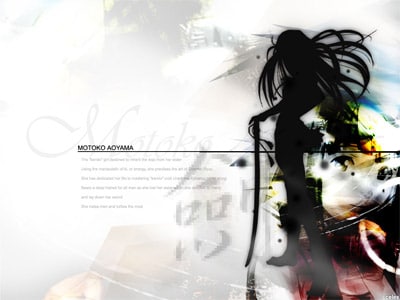
Motoko from Love Hina
Some Winamp skins I created:
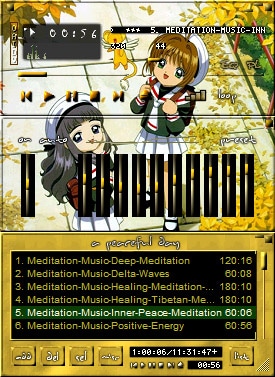
Card Captor Sakura
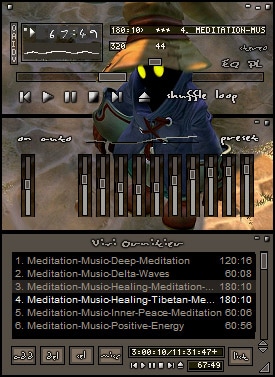
Vivi Ornitier from Final Fantasy 9
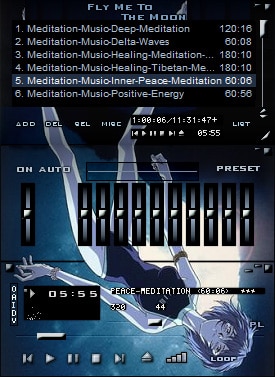
Another one with Rei from Evangelion.
A couple of my digital artworks:

Digital Botany: What a plant would look like if it were grown digitally (in my view)

Imagination: Burst of light rays
Business, Marketing
By 2002, I began to drift away from the online space. Part of it was to focus on my real-life priorities; another part was because my webmaster friends were beginning to drift away for that very reason. One by one, I stopped renewing my domains; one by one, I shut down my sites. By 2005, all my sites were gone.
When it came to university in 2003, it was time to choose my course of study. With no strong passion for the available courses, I opted for Business Administration. It seemed like a good choice, one in alignment with my goal to earn a lot of money.
Over the next three years, I dedicated myself to making the best out of my university course. I soaked myself in everything that school had to offer, from the coursework, to classes, to case studies, to project work. To build up my leadership skills, I participated in core-curricular activities and case study competitions. I also started a graphic/web design business and did freelance graphic/web design, and became a private academic tutor (giving tuition three times a week) as part of leveraging my skills to earn money.
Finally, since I specialized in Marketing, I pitted myself against a thousand candidates for a highly coveted internship in a Fortune 50 company, which was essentially the dream job for marketers then. After multiple rigorous tests and interviews, I got the internship. I would eventually get a Marketing job offer after a grueling 2.5-month internship. I later graduated from my school as the top student in Marketing.
I would later discover my real passion and purpose — to grow and help others achieve their highest potential — which ironically had nothing to do with video games, web development, web or graphic design, business and marketing, or even making money.
I’ve since turned my passion into my career, from discovering my ideal vision, to quitting my day job, to pursuing my passion with no money, to earning my first passion dollar, to building my skills, to turning my blog into one of the top personal development blogs in the world, to hitting over $100,000 in annual revenue (I share the early steps of my passion journey in my passion series). It’s been seven years of doing this and I can’t imagine doing anything else for life.
5 Lessons I’ve Learned in My Journey
Now, why am I sharing this story? There are five lessons I want to highlight here:
#1. It’s okay to want to learn, do everything
I have a lot of readers who tell me they are interested in EVERYTHING and they want to learn and do EVERYTHING. They in turn freeze up and do nothing because they don’t know what they should pursue over others.
But, guess what? It’s okay to want to learn EVERYTHING. It’s also okay to want to try your hand at EVERYTHING. After all, if you don’t try, then how are you supposed to know what exactly you like?
During my passion journey, I was constantly learning and exploring different things. Firstly, there were the video games that I played intensely in my childhood and teens. Every time I played a game, I would immerse myself in its universe. With 100 games, it was as if I had been in 100 different universes. With anime, I would watch them intensely and be very wrapped up in everything about each show, from the characters to the plot.
When it came to web development, I soaked myself in everything I could find on the WWW. I started with WYSIWYG (“what you see is what you get”) cookie-cutter site builders but quickly switched to coding HTML myself when I realized the limitations of such editors. I saw people creating fancy graphics and I wanted to create high-quality artwork just like them — and then started to learn graphic editing by myself. I created a website and felt it wasn’t enough — I ended up having 10 whole websites in less than 3 years because I wanted to try my hand at everything. In total, I created a total of 13 websites during my teen years!
Now some of you may say you don’t have time to do everything. Yet, trying everything doesn’t mean that you quit your job or studies to do things full time. It literally means what it says: Try. Dabble. Explore! For example,
- Interested in becoming a YouTuber? Start a YouTube channel and post a couple of videos for fun.
- Interested in drawing? Do some sketches and post them on Facebook for feedback; join a drawing club to meet other artists.
- Interested in stand-up comedy? Practice a few stand-up routines by yourself, then try them out at your local comedy club.
- Interested in cooking? Experiment with some recipes; start a food blog.
- Interested in coaching? Read coaching books, join a weekend workshop to learn some basics, and offer to coach your friends for free.
What are your interests? Your passions? Your hobbies? Write them down, and then start pursuing them, perhaps one or a few at a time. Don’t restrict yourself or hold yourself back. Experiment and let yourself learn freely, like a child. Let yourself soak up everything the universe has to offer. Embrace everything with curiosity. :)
#2. As you learn/do, you’ll learn new things about yourself
The great thing about trying everything is that you’ll readily get insights into what you like and don’t like. Rather than wonder if X thing is right for you or not, you can get this answer by testing it out and seeing how you feel when doing so. The great thing is that you’ll probably get some good insights after a while without literally having to try everything.
Each time I pursued something to the nth degree, I would eventually realize something about myself or what I was doing. The realizations were never big aha’s — most of the time they were unconscious shifts — that contributed to me discovering my purpose later on. For example,
- After playing the nth game and getting the top score for the nth time, I began to realize that I wasn’t getting much out of games. I realized that I was putting all this effort into gaming but getting nothing back in return. I realized that it made more sense for me to get out there, live my life, and create my adventures than to live vicariously through fictional characters. I subsequently distanced myself from games and worked on building my real life.
- With web development, after making so many sites and bringing every one of them to success, I began to lose interest in web development as a whole. In retrospect, I was really passionate about what I was learning and creating and the people I was meeting through my sites, not web development per se. Websites were more like the proxy for me to build my skills, create content, and add value to others.
- Same for web/graphic design — while I developed a good level of skills and even started a web/graphic design business, it was ultimately a proxy for me to grow, learn, and develop myself, vs. my true passion.
These insights slowly nudged me to my true purpose later on.
How long does it take to get such realizations?
Firstly, think of awareness as a gradual process. As opposed to thinking of it as you reaching sudden “enlightenment” one day, I’d like it’s more of a gradual shift — marked by several small revelation moments — where you become more aware day after day. This awareness is built up through experience. Constant self-reflection is also important to accelerate your self-discovery — and I share my exercise to discover your life purpose here: Discover Your Life Purpose in the Next 30 Minutes
Secondly, it depends on how far along you are in your growth journey. If you’re 16 and just getting started on your personal growth, your realization probably isn’t going to happen tomorrow. If you’re 30, have always stuck to what’s “safe,” and have never brought a goal to fruition, then there’s probably some work to be done too. If you’re 40 and have lived a busy life pursuing many goals, then it’s probably not long before you figure out what draws you.
With the things you like, continue doing more of them. With the things you dislike, cut down on them or drop them altogether. The goal here is to keep building on your likes while distancing from your dislikes. This will eventually lead you to your ideal path.
It is very important to note that “exploring” comprises 2 parts: exploring in breadth (variety) of interests and exploring in depth (intensity) of each interest. Some people say to me: “Hey I’ve been trying, exploring so many things; why is it that I don’t know my passion yet?”
My question back then is: “Well when you ‘explore,’ how exactly are you ‘exploring’? Are you just tapping and going at every single thing? Are you just searching Pinterest and checking things out on Google? Or are you rigorously bringing your goals to fruition?” Because while you should absolutely drop the goals that don’t interest you, ultimately you need to learn to see your goals through to their highest results. There are important learning points that come from doing so, such as developing a core competency, persistence, grit, hard work, critical thinking, and the ability to work through obstacles and overcome them. (For more on “breadth” and “depth,” read How To Know What You Want To Do In Life.)
The point here isn’t to turn your exploration into some race. You want to use this time to properly learn, explore, and pursue your interests to the highest level, as you figure out what you really want to do in life.
#3. All knowledge is applicable — just a matter of how you use it
In the opening, reader Nana asked what she can do about the things she wants to learn, such as philosophy, history, religion, and anthropology. Besides enjoying the knowledge, what can she do about it?
Well, this depends on the field. As I’m not directly familiar with these fields, I can’t comment on the above. Rather, I’ll put it this way:
- When you learn, it doesn’t mean the knowledge must be applicable right away or at all. Applicable as in being put to practical use, say to earn money or get a job. Sometimes knowledge is meant to enrich, to help us understand more about the world, and to push us to think critically. These are a kind of application too.
- Just because the knowledge can’t be applied right away in the practical sense doesn’t mean it’s useless. See #1.
- Your newly acquired knowledge and heightened awareness will come into play, be it directly or indirectly, sometime down the road. It just depends on whether you’re able to synthesize the raw knowledge in your mind for the respective situation and whether you’re able to spot opportunities when they arise. Think of knowledge as an essence that’s formless and shapeless, and it’s up to you how you want to use this knowledge.
Example #1: Steve Jobs and Calligraphy
Most of us know Steve Jobs as one of the key shapers of today’s tech, but what’s surprising is that he actually studied calligraphy when in school. Actually, just one course, and he took it after he dropped out of college — because Jobs didn’t want to spend his parents’ money on expensive tuition as they weren’t rich. Despite dropping out, he spent the next 18 months dropping in on college classes that interested him, including a calligraphy course.
This calligraphy course proved to be monumental for Jobs would later use what he learned in the course and build that into the Mac.[1][2]
“It was the first computer with beautiful typography. If I had never dropped in on that single calligraphy course in college, the Mac would have never had multiple typefaces or proportionally spaced fonts.” — Steve Jobs
As it turned out, what Jobs learned in the calligraphy course didn’t just influence the design of the Mac — it also influenced how he approached the creation of products at Apple. Apple products — MacBook, iPhone, iPad, and iPod — would become associated with a sense of artistry and sleek visual style that’s equally matched by functionality, something which subsequently set them apart from all their competitors.[3]
Example #2: Natural Ecosystem and Architecture
Have you heard of a mall that can keep itself cool without air-conditioning? Well, Eastgate Shopping Centre does just that. It’s the first shopping center in the world with a natural cooling system — it can cool itself without air-conditioning, despite being located in Harare which can go up to 40°C / 104°F in the hottest season! How does it do that?
Its architect, Mick Pearce, got the idea from termite mounds. Termites can only survive when their environment has a constant temperature of 30°C / 86°F as that’s the temperature needed to grow fungus, which is their food.[4] Termites cleverly keep their mounds at a constant temperature by regularly creating new vents and closing off old ones. Since warm air rises, convection air currents then draw the warm air through the openings and out of the mounds. The constant opening and closing of vents help maintain the heat and humidity inside the mound as well.
Yet, how would Pearce, who studied at an architectural school, know anything about this though? As it turns out, Pearce happens to have a passion for understanding natural ecosystems, a field that extends far outside of architecture.
By implementing this same design, Eastgate Centre is able to use only 10% of the energy than other buildings its size, leading to significant savings. In the first 5 years alone, the building’s owner was able to save $3.5 million from energy savings; Eastgate became a reference for architectural breakthroughs; and Pearce won many awards for his work with Eastgate.[5][6] The design was subsequently used by the Portcullis House in London.
Suppose Pearce has always kept to studying only architecture and never ventured out in learning, exploring his interests in natural ecosystems. Then perhaps the idea of the natural cooling system wouldn’t have existed (or at least, not invented by Pearce).
Example #3: Web Development, Consumer Goods, Personal Development
When I learned web development, I didn’t anticipate that I would set up a web business in the future or that it would play such a big part in my business today. I just learned it because I was interested in it. Subsequently, when I decided to start my self-help business, I was able to leverage my past web knowledge to build my site. Not only that, but I also used ideas that I learned while working in my previous job to market my new business — even though my previous industry (consumer goods; skincare) is totally different from personal development.
Would PE be so online-centric if I hadn’t learned web development before? Maybe yes, maybe no. The thing is that we can never predict how the information we learn today can help us in the future. However, what we can do is to learn as much as we can and to explore enthusiastically, with a learning mind. When you gain mastery of the knowledge, you then become more aware of situations where this knowledge can be applied and how to best apply it.
#4. Develop Mastery
Many people ask me how to become great at something. How to start X and become successful. How to pursue Y and make it their living.
You got to keep at it. Build your skills. Build your experience. Level up. Earn your credits. There is no shortcut to expertise and success (except if you’re born into the rich/famous, but this is hardly our interest).
How do you choose what area to get good at? Well, you pursue your general areas of interest (see Lesson #2). Keep at the ones that excite you week after week while dropping the ones that don’t. The process of doing the same thing continuously will help you get good at it. Over time, you’ll find that you’ve moved from very lousy to okay. And then, from okay to good. After that, from good to better. Before you know it, you’ve become so good that you’re one of the best at what you do! The goal here is to devote yourself to mastery in what you spend time in.
Perhaps you are worried about developing yourself in a field that you eventually tire of. Perhaps you don’t want to invest your time and energy unless you’re sure it’s something you really like. But as I’ve shared in The Superstar Effect, when you achieve expert status at something, the path to success in other areas does become easier, even if they are unrelated fields. That’s because (1) there will always be soft and hard skills you can carry from one area over to another, and (2) in the process of building mastery in area X, you will likely build connections, credibility, and resources that can then be used for other goals.
So rather than ask “How can I earn money from X?” or “How can I turn X into a living?”, think about how you can become great at X first. When you become a master at something, the possibilities of what you can do with it will be boundless.
On developing mastery:
- Skills Development
- Level Up
- 10,000 Hours To Develop Talent
- Why Do Some People Have Innate Talent But Not Others? It’s Not Fair!
#5. Your ideal career is something you need to fight for
So you’re not doing work that’s in line with your passion. So you hate what you’re doing. So you wish to work in field X but you can’t find any opportunities.
Well, I can tell you that almost everyone starts off working at a place that’s not their ideal job. I was once in a jail-like job environment where I was required to stick tape all day long in exactly the same set of moves. I wasn’t allowed to talk to anyone, look at my phone, or go to the loo except during stipulated five-minute breaks. I felt like I was going to die. I shared before in The Night I Cried that I was trapped in a dreadful job assignment and had a boss I really hated at that time. And before I started PE, I was in a job that I didn’t feel passionate about anymore and couldn’t be more different than what I’m doing now — I was working in an FMCG company (fast-moving consumer goods) and leading million-dollar business initiatives for a global skincare brand.
What do you do? Do you let yourself be run over by your situation? Heck no. You step up and make a difference. You fight for what you love and what you believe in.
When you’ve fully implemented Lessons #1, #2, and #4, you would have (1) good clarity of what domain you want to step into and (2) a portfolio of hard and soft skills that you can bring to the table. You are now ready to work towards your ideal career. I’ve written a lot on how to work towards your ideal career:
- Passion or Money?
- How To Discover Your Ideal Career: Your Message and Your Medium
- The Day I Quit My Job to Pursue My Passion: 6 Things to Do Before You Quit Your Job
- Should You Start a High-Profit Business or Do Something You’re Passionate About But Isn’t Lucrative?
- Other articles in my passion series
Endnote
To Nana and all of you who are cluttered by many passions and interests, remember to just get out there and try, do, and build your mastery. Awareness doesn’t come from sitting down, doing nothing, and feeling fearful/conflicted. Awareness comes from stepping forward to gain experience. I wish you all the best in your passion journey. ♥
Check out my How To Pursue Your Passion series for more articles on pursuing your passion.
(All website screenshots, Winamp skins, and wallpapers © Celestine Chua)


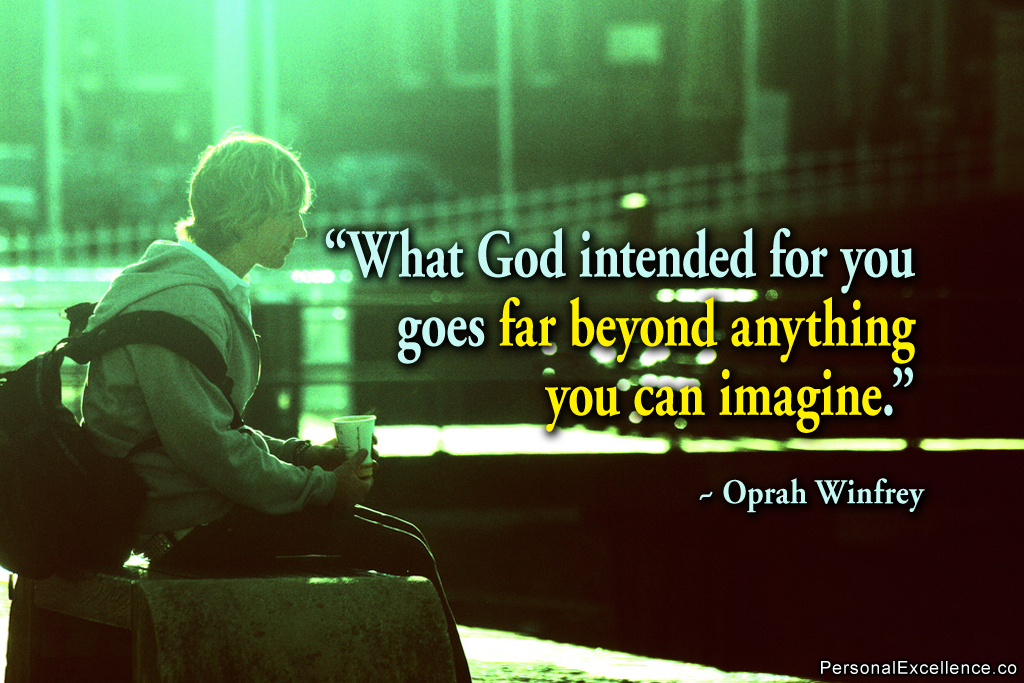


![How Many Times Should You Try? [Infographic]](https://personalexcellence.co/files/infographic-failure-400x315.png)
 I hope you find my content helpful. Join my community of 65,000 readers and get my latest articles delivered to your inbox. Your email is safe and I never send spam.
I hope you find my content helpful. Join my community of 65,000 readers and get my latest articles delivered to your inbox. Your email is safe and I never send spam.
Commenting for this post is closed.